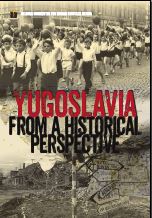PART II: YUGOSLAV EXPERIENCE FROM NATIONAL PERSPECTIVES - Montenegro and the Montenegrins in the Yugoslavia - Statehood loss and its renewal
PART II: YUGOSLAV EXPERIENCE FROM NATIONAL PERSPECTIVES - Montenegro and the Montenegrins in the Yugoslavia - Statehood loss and its renewal
Author(s): Šerbo Rastoder
Subject(s): Recent History (1900 till today)
Published by: Helsinški odbor za ljudska prava u Srbiji
Summary/Abstract: Montenegro, in the 20th century, is an example of “accelerated history” in which the dynamics of change and the complexity of historical occurrences accentuated the phenomenology of its history and its largely ideologically biased perception. In the the 20th century, Montenegro had been an independent state until 1918; an integral part of the Kingdom of Yugoslavia (1918–1943); one of the six socialist republics in socialist Yugoslavia (1943–1992); and a member state of the two-state Yugoslav federation (FRY) 1992–2006. At the referendum of May 21, 2006, Montenegro renewed ist statehood and once again became an agent in its own right in Balkan and European history. It looked as if Montenegro had “spent” an entire century running around in a circle looking for itself. Crucified between the myth of its own historical significance and its objective importance as measured by statistics and hard pragmatism, Montenegro had always strived to outdo itself. This is why, in the historical sense, it is a place of extremes and contradic-tions that are diffcult to reconcile. In that kingdom of illusions modern ideologies supplanted the old in an attempt to “bury” them, just as the “old”, for which many had thought they were al-ready only a part of historical archives, kept resurrecting themselves. In the 20th century the conflict between the traditional and patriarchal and the modern also determined the dramatic social changes that appeared on the surface to be the surrogates of different ideologies.
In the 20th century, Montenegro had gone through four wars, two of them world wars. At the end of World War I it had lost its statehood, and at the end of World War II it had partially re-stored the attributes of statehood. At the end of the 20th century, in the break-up of Yugoslavia, Montenegrin society was confronted with a new historical challenge and with the re-emergence of old historical redundancies. Although it was not, as an independent political agent, a direct participant in the wars marking the break-up of the former Yugoslavia, the consequences of events of the last decade of the 20th century, excluding the fact that on its territory there were no direct hostilities, were equally as dramatic for Montenegrin society as the previous wars.
Book: Yugoslavia from a Historical Perspective
- Page Range: 90-125
- Page Count: 36
- Publication Year: 2017
- Language: English
- Content File-PDF

